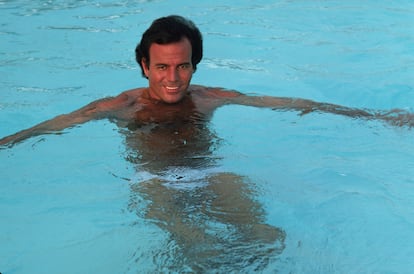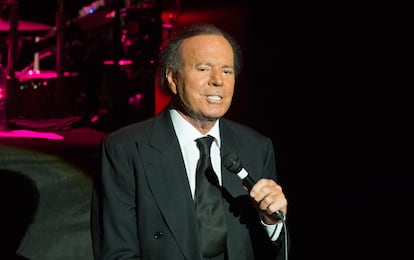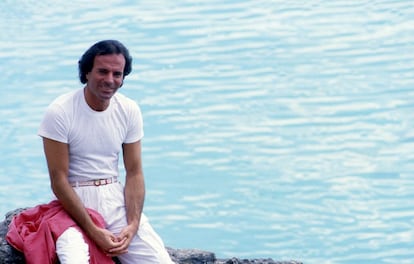The seductive appeal of Julio Iglesias: ‘Everyone ends up charmed by him, even those who are biased against him’
A French documentary explores the career of Spain’s most successful musical export – a chameleon who performed in Pinochet’s Chile and pleaded Spain’s case to Henry Kissinger on behalf of the Socialist Spanish government

June 15, 1977: Spain holds its first election since 1936 and Julio Iglesias has been invited onto a TV show to keep voters calm and encourage cohesion. And who better to do it than the man who speaks equally to young and old? “You don’t think I’m about to make a political speech now, do you?” he says, wearing 1970s horn-rimmed glasses. “Today has been a day of unity. Everyone has voted for their ideals. Let’s hope that through these ideals all Spaniards will emerge the winners.” Then he sings a song written by Ramón Arcusa from Dúo Dinámico. The song was not originally for him, but then Arcusa came to believe he was the only one who could sing it. And, so, Iglesias found himself singing lyrics that nailed the essence of his enigmatic appeal: Soy un truhán, soy un señor – I’m a rogue. I’m a gentleman.
French director Anne-Solen Douguet has worked her way through the archives compiled on the crooner in Spain, France, Italy, the United States, and any other countries where he has enjoyed success. The result is Arte.tv’s documentary Julio Iglesias, Life and Work. It is a portrait of Spain’s most successful musical export. A charmer, who has dedicated himself to conquest in all senses of the word. “I think he is a man with a great feeling for society,” Douguet tells EL PAÍS. “But above all with a great appeal for those in power. He has always been able to maintain political neutrality, to speak to everyone. That’s what makes him a diplomat.”
From the many hours that she spent with her nose in the archives, Douguet has managed to produce images of Iglesias with Spain’s king emeritus, Juan Carlos I, Spain’s former Socialist prime minister, Felipe González, former US First Lady, Nancy Reagan and former Spanish prime minister, José María Aznar, featuring in the closing act of his 1996 electoral campaign. Years later, in 2004, when relations between Spain and the United States were at their worst due to Spain’s withdrawal from Iraq, Julio was in charge of mediating at the request of former Socialist Minister of Defense, José Bono. “Pepe called me and said, ‘Julio, can you help?’” Iglesias recalled in an interview. “I didn’t know [Donald] Rumsfeld, the American defense secretary, but I did know Henry Kissinger. So I called him and told him that our Minister of Defense was going to go to the Pentagon to meet with Rumsfeld and that he should receive him.” His intervention facilitated the reestablishment of diplomatic relations between Spain and the US.
“I think it’s his neutrality that put Julio above too much criticism,” says Douguet. “He wanted to talk to everyone. At the beginning, he was close to the [Franco] regime because he had no choice. If he hadn’t been, he wouldn’t have had a career. But I never had the feeling that he was pro-regime. On the contrary, whenever he had the opportunity, he defended democracy and encouraged people to go and vote, in Spain and in Chile.”

The launch of his career, in 1968 Spain, was not, however, so neutral. His father, Julio Iglesias Puga, a gynecologist who was respected in Francoist circles, intervened on his behalf to get him a slot at the Benidorm Festival, where a shy 25-year-old Julio had to come out of his shell and sing the only song he ever wrote himself, La vida sigue igual – Life goes on. It was a song he wrote during his two-year convalescence from an accident that ended his dream of being a professional soccer player for Real Madrid. At the time, Iglesias was planning to study law and pursue a diplomatic career. Though this never happened, he did become the best public relations man in Spain.
The documentary challenges the cliché of the “old-fashioned crooner with the somewhat tacky songs.” As Douguet points out, many in France think that Julio was half French or that he lived in France because they have always heard him sing in French. In fact, he sang his songs in 14 languages in order to become international in a way that most Spanish musicians at the time could only dream of.
In the documentary, Douguet relates Julio Iglesias’ life to the history of Spain as his success cannot be understood without taking the Franco regime into account. The internationalization of his career was possible because he represented an aspect of Spain the powers-that-be wanted to sell to the outside world: young, educated and talented. “He took advantage of the freedoms offered by the regime, which was not the same for other artists. But I know from several sources that Julio intervened on behalf of at least one or two anti-regime artists.”
His apparent neutrality even led him to perform in countries that had just been subjected to significant repression, such as Chile. In 1977, shortly after Chile’s National Stadium was used as a prison and torture chamber by the Pinochet regime, Julio Iglesias filled it with his fans. “I sing to the people,” he explained in an interview. “I have sung to everyone. I have sung in Chile in controversial times and I don’t regret it. Why should I limit myself?” In Douguet’s words: “He’s an opportunist. His drug was the stage.”

So, was Iglesias in possession of an unparalleled gift for neutrality or was he simply a man of his time? Would a contemporary artist be allowed to intervene politically as he did? Probably not. Nor would the public react in the same way regarding his attitude to women: “I love women. I need them around. They are a great stimulus. That’s very Hispanic. I enjoy the affection and tenderness of a woman more than anything. I need the kind of physical contact that makes me feel virile.”
After Madrid-based socialite Isabel Preysler left him, Julio publicly admitted that he had “failed” to build a family with her. Preysler was in love with the man, but the singer was a Don Juan and an extremely jealous partner. “Julio is a macho man, just like his father,” the documentary notes. “You play a double game,” was how a French journalist put it to him in an interview during the 1980s. “On stage you are a conqueror with provocative moves. But according to the lyrics of your songs, you are a victim, and the songs make women want to comfort you.” Julio laughs and concedes, talking about himself in the third person: “Love is at the core of his business. Julio Iglesias will not change.”
Meanwhile, his older children by Preysler grew up in his shadow, more accustomed to receiving affection from their father’s manager, Alfredo Fraile, than from the man himself. Musically, Enrique Iglesias blazed his own trail, with the help of his father’s former press officer, Fernán Martínez. And he succeeded. Julio Iglesias Junior wanted to do likewise, but his music career failed to take off in the same way.
Iglesias Senior’s was an act he wanted neither of his sons to follow. Until the 2000s, he was able to adapt to new audiences. He continued to fill venues, albeit smaller and smaller, but he was determined to remain number one, and he was certainly not willing to share the limelight with Enrique, with whom he has never shared a stage.
“In the 1990s, he was still selling a lot of records, but from the 2000s onwards, his music no longer spoke to the younger generations,” says Douguet. “I think that when Enrique took to the stage, he wasn’t ready to pass the baton. He didn’t want the competition.” The music and the warmth of the people took precedence over “any kind of love,” he confessed in interviews. In short, his fans and his music would always come before his family. As he said, “There is no better cure than being on stage and having the affection of many people. And that happens to me every day.”

The portrait drawn by the documentary which has been aired on French TV and which is available until June, does not include direct interviews with the singer, who will be 80 in September, or with members of his inner circle. There are several reasons for this, the main one undoubtedly being Douguet’s fear of being conquered by Iglesias in the flesh and losing objectivity. But she did conduct many interviews with people who had met him or interviewed him. “Not one of them spoke badly of him,” she says. “Everyone ended up charmed by him, even those who were biased against him. The general consensus is that he is an intelligent, charming man, who gives you the impression of being his best friend after an hour in his company. He has an impressive charisma.”
So, how was Douguet going to escape his spell? “When I started to investigate I told myself, it wasn’t possible,” she says. “There must be people who don’t like him. He can’t be that charming. But even people he had fallen out with speak well of him. I ended up believing that he was.”
Sign up for our weekly newsletter to get more English-language news coverage from EL PAÍS USA Edition
Tu suscripción se está usando en otro dispositivo
¿Quieres añadir otro usuario a tu suscripción?
Si continúas leyendo en este dispositivo, no se podrá leer en el otro.
FlechaTu suscripción se está usando en otro dispositivo y solo puedes acceder a EL PAÍS desde un dispositivo a la vez.
Si quieres compartir tu cuenta, cambia tu suscripción a la modalidad Premium, así podrás añadir otro usuario. Cada uno accederá con su propia cuenta de email, lo que os permitirá personalizar vuestra experiencia en EL PAÍS.
¿Tienes una suscripción de empresa? Accede aquí para contratar más cuentas.
En el caso de no saber quién está usando tu cuenta, te recomendamos cambiar tu contraseña aquí.
Si decides continuar compartiendo tu cuenta, este mensaje se mostrará en tu dispositivo y en el de la otra persona que está usando tu cuenta de forma indefinida, afectando a tu experiencia de lectura. Puedes consultar aquí los términos y condiciones de la suscripción digital.








































